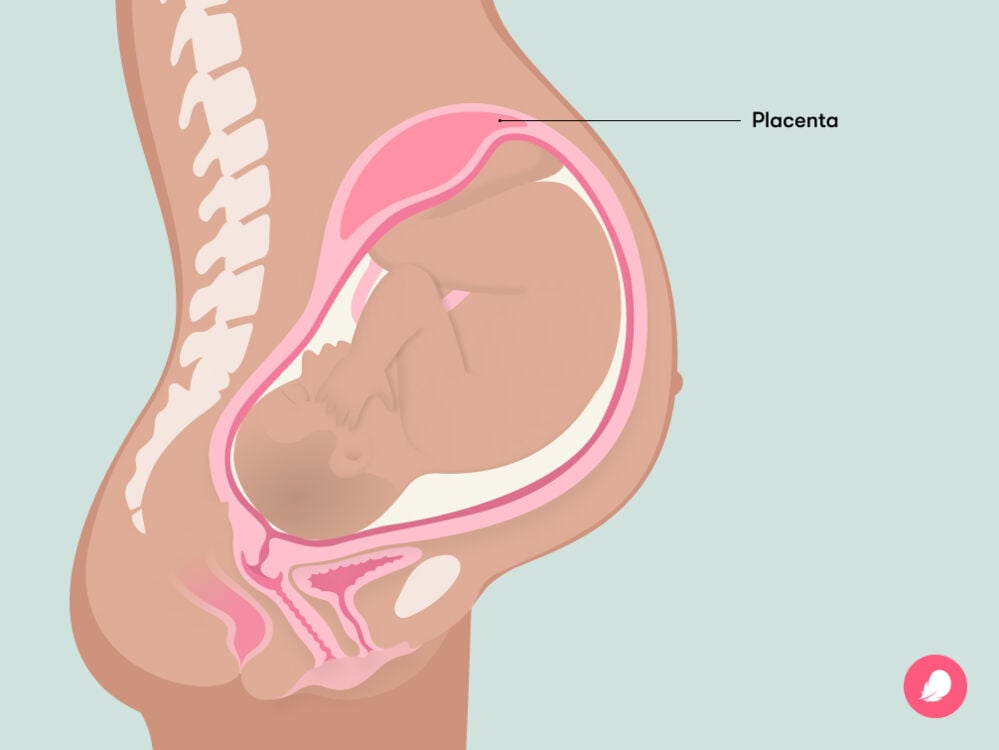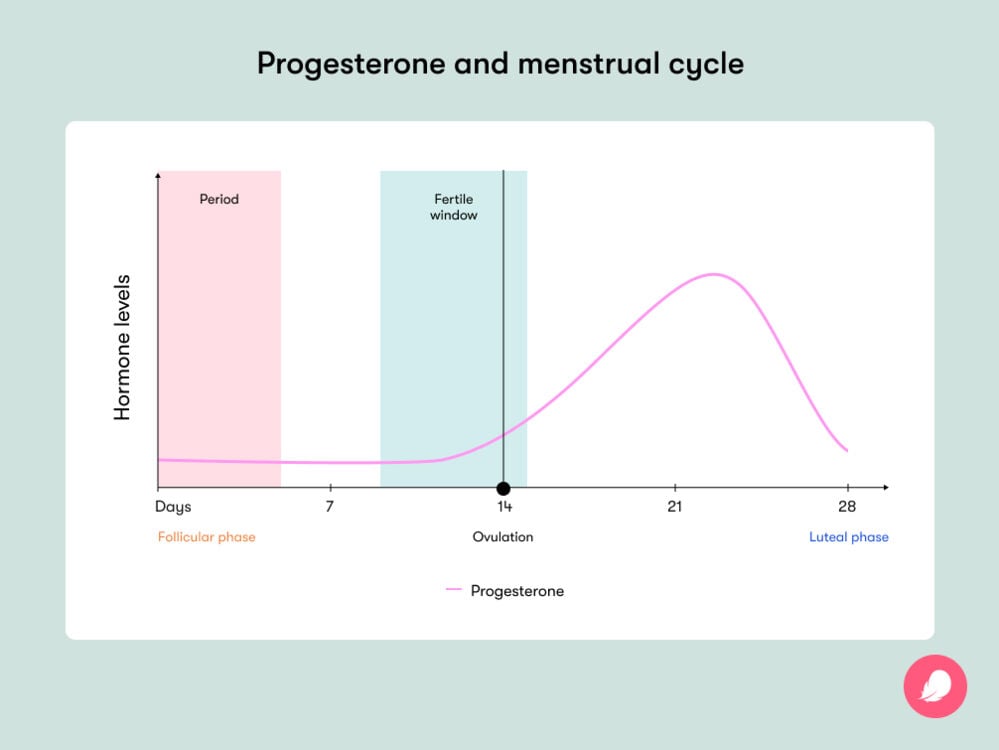Your hormones trigger some monumental processes during your cycle, but can progesterone help you get pregnant? A Flo expert explains all.
-
Tracking cycle
-
Getting pregnant
-
Pregnancy
-
Help Center
-
Flo for Partners
-
Anonymous Mode
-
Flo app reviews
-
Flo Premium New
-
Secret Chats New
-
Symptom Checker New
-
Your cycle
-
Health 360°
-
Getting pregnant
-
Pregnancy
-
Being a mom
-
LGBTQ+
-
Quizzes
-
Ovulation calculator
-
hCG calculator
-
Pregnancy test calculator
-
Menstrual cycle calculator
-
Period calculator
-
Implantation calculator
-
Pregnancy weeks to months calculator
-
Pregnancy due date calculator
-
IVF and FET due date calculator
-
Due date calculator by ultrasound
-
Medical Affairs
-
Science & Research
-
Pass It On Project New
-
Privacy Portal
-
Press Center
-
Flo Accuracy
-
Careers
-
Contact Us
Can progesterone help you get pregnant? What you need to know


Every piece of content at Flo Health adheres to the highest editorial standards for language, style, and medical accuracy. To learn what we do to deliver the best health and lifestyle insights to you, check out our content review principles.
If you’re trying to get pregnant, then you may have immersed yourself in the world of trying to conceive. Your doctor may have recommended new supplements or light exercises to improve your chances of getting pregnant. But do your hormones play a role?
Every process in your menstrual cycle, from your period to ovulation and potential pregnancy, is driven by the rise and fall of your sex hormones. These include progesterone and estrogen. These natural chemicals are pretty powerful things.
So let’s dig into the role of one specifically: progesterone. Here, a Flo expert will outline everything you need to know about progesterone, from what it is to whether progesterone can help you get pregnant.
Key takeaways
- Progesterone is one of the two main sex hormones regulating your menstrual cycle. The other is estrogen.
- Progesterone and estrogen are released in varying amounts during different phases of your menstrual cycle. They act as chemical messengers, signaling changes like your period and ovulation.
- One crucial role of progesterone is to trigger processes that help when you conceive and then support your new pregnancy as it develops. More on that below.
- Most people won’t need to top up their progesterone levels when they’re trying to conceive. Your body produces enough of it all by itself.
- Some signs of low progesterone levels include irregular periods and problems with getting pregnant. If you’re concerned about your progesterone levels or hormone imbalances, it’s important to speak to your doctor, as they will be best placed to help you.
Take a quiz
Find out what you can do with our Health Assistant
What is progesterone, and why is it important?
Before we dive into whether your progesterone levels may impact your chances of getting pregnant, it can be helpful to understand what it even is.
Progesterone is a hormone that plays a key role in your menstrual cycle. Your progesterone levels rise and fall throughout your cycle, and these fluctuations can trigger some pretty important processes. Its main role is to prepare your uterus for a potential pregnancy. Keep reading to find out how it does this.
How does progesterone affect ovulation?
To understand the role progesterone plays in conception, it can be handy to know how it may fluctuate throughout your cycle. Your cycle is split into two phases. The first is called the follicular phase, and it starts on the first day of a new period. During this time your progesterone levels will generally be low.
In the week after your period, small follicles or sacs start to grow in your ovaries. This is where an egg will develop, ready for ovulation. You can think of ovulation as a big event that splits the two menstrual cycle phases. It describes the moment when one of your ovaries releases an egg.
After ovulation, when you enter the luteal phase of your cycle, your progesterone levels start to rise. You might be curious as to why that is. Just after ovulation, your body forms a collection of cells in the ovary called the corpus luteum. It’s the job of the corpus luteum to make your uterus a healthy place for a pregnancy to develop. “The corpus luteum cells in the ovary develop from what used to be the follicle where the egg grew and developed before it was released. They are a very hardworking group of cells,” says Dr. Jennifer Boyle, an obstetrician and gynecologist at Massachusetts General Hospital, Massachusetts, US, who sits on Flo’s expert board.
The corpus luteum releases progesterone at this point, which helps to prepare the lining of your uterus to support an early pregnancy. If you conceive, then your egg may travel down a fallopian tube and attach to the lining of your uterus. This is easier if your lining is thick. It’s called implantation and marks the beginning of pregnancy. If you’d like to learn more about this process, you can use Flo’s implantation calculator.

The corpus luteum continues to release progesterone for the first 12 weeks of pregnancy to ensure that the lining of your uterus is ready, giving your fertilized egg (which is now known as an embryo) all the nutrients it needs. From around week 12, your placenta will take over the creation and release of progesterone. This is a whole new organ that your body grows to support your baby.
If you didn’t conceive this cycle, then your corpus luteum breaks down, and your progesterone levels start to drop in the week before your period. This causes the lining of your uterus to break down, and it leaves your body through your vagina — this is your period.
Between fluctuations in your hormone levels and understanding your fertile window, it can feel overwhelming when you’re trying to conceive. You can use an app like Flo to get a better understanding of your body and your cycle. Flo’s ovulation calculator can help you understand when you might be ovulating based on recent cycle dates, and you can learn more about the best time to get pregnant.
Can progesterone help you get pregnant?
Not exactly. As we’ve said, progesterone is important when it comes to preparing the lining of the uterus to support early pregnancy. When your uterine lining is thicker, it provides nutrients and support in early pregnancy. However, if you’re trying to conceive, then there isn’t a “best” level of progesterone to help you get pregnant faster.
You might have heard that taking progesterone as a supplement can increase your chances of getting pregnant, whether your natural levels of the hormone are low or not. However, this isn’t true. There isn’t any conclusive medical evidence to suggest that it helps when you’re trying to conceive.
“Progesterone helps the uterine lining to become ready to support and nourish the fertilized egg after it implants,” says Dr. Boyle. “So progesterone will not help you become pregnant in and of itself. But if the egg is successfully fertilized, it is progesterone that makes the fertilized egg have a healthy place to implant and grow.”
How does progesterone impact fertility?
Since progesterone helps to prepare the lining of your uterus and support your baby as it grows and develops, if your natural levels of the hormone are low, then it may be more difficult to conceive.
“If you have regular menstrual cycles, you can rest assured that your body is ovulating and producing progesterone healthily,” says Dr. Boyle. “If you have regular cycles and are having trouble becoming pregnant, you should meet with your doctor to figure out why. But with regular cycles, it is very unlikely that there is any problem with your progesterone.”

It’s really important to note that it’s tough to know if you have a hormonal imbalance or low progesterone levels at home, without seeking medical advice or testing. The symptoms linked to low progesterone can be signs of lots of other things, so try not to jump to conclusions.
If you aren’t pregnant, the symptoms linked to low progesterone include:
- Irregular periods
- Difficulty getting pregnant
- Hot flashes
- Changes in mood
- Headaches
- Difficulty sleeping
If you are already pregnant and think you might have low progesterone, the symptoms include:
- Light bleeding (known as spotting)
- Tiredness
Low progesterone can also cause more serious pregnancy complications such as preterm labor. Additionally, if you have lower progesterone levels and your uterine lining hasn’t thickened or isn’t prepared to support an early pregnancy, then this could lead to miscarriage. This may sound really scary, but try to remember, it’s impossible to diagnose yourself with low progesterone at home, so speak to your doctor.
If you’re worried that you haven’t ovulated, wondering if it could be causing irregular periods, or struggling to get pregnant, your doctor might check your progesterone levels with a blood test. If they do find that you have low progesterone levels, then they will talk about the best next step for you.
You can use a period-tracking app like Flo to track your cycle dates and symptoms and learn more about how your hormones can impact the way you feel.
Understanding the role of progesterone levels in pregnancy
When the lining of your uterus thickens each cycle, it becomes rich with blood vessels. This is what provides your developing embryo with nutrients in the first few weeks of pregnancy.
At around week 12, your placenta takes over the production and release of progesterone. Amazingly, your progesterone levels continue to increase throughout your whole pregnancy, peaking during your 3rd trimester (weeks 28 to 40).
More frequently asked questions about if progesterone helps you get pregnant
How do I know if I need progesterone to get pregnant?
Generally speaking, you don’t need to take progesterone to help you get pregnant. Progesterone helps to create a healthy environment before you get pregnant. However, it doesn’t help you get pregnant, in and of itself.
What happens if you take progesterone before ovulation?
If you’re trying to get pregnant, there would be no reason why your doctor would suggest you take progesterone before ovulation. Taking progesterone before ovulation can in fact inhibit ovulation altogether, and ovulation is crucial for getting pregnant.
There are other cases when you might take progesterone before ovulation — for example, to manage your cycle if you’ve been diagnosed with a condition like polycystic ovary syndrome or as a method of birth control when you’re trying to prevent pregnancy. However, this is something you should always discuss with a health care professional.


Hey, I'm Anique
I started using Flo app to track my period and ovulation because we wanted to have a baby.


The Flo app helped me learn about my body and spot ovulation signs during our conception journey.


I vividly
remember the day
that we switched
Flo into
Pregnancy Mode — it was
such a special
moment.
Real stories, real results
Learn how the Flo app became an amazing cheerleader for us on our conception journey.
References
Barbieri, Robert L., and David A. Ehrmann. “Patient Education: Polycystic Ovary Syndrome (PCOS) (Beyond the Basics).” UpToDate, 7 Nov. 2023, www.uptodate.com/contents/polycystic-ovary-syndrome-pcos-beyond-the-basics/print.
“Corpus Luteum.” Cleveland Clinic, my.clevelandclinic.org/health/body/21849-corpus-luteum. Accessed 25 Oct. 2024.
“Estrogen.” Cleveland Clinic, my.clevelandclinic.org/health/body/22353-estrogen. Accessed 25 Oct. 2024.
“Fertilization and Implantation.” Mayo Clinic, www.mayoclinic.org/healthy-lifestyle/pregnancy-week-by-week/multimedia/fertilization-and-implantation/img-20008656. Accessed 25 Oct. 2024.
“Follicle-Stimulating Hormone (FSH).” Cleveland Clinic, my.clevelandclinic.org/health/articles/24638-follicle-stimulating-hormone-fsh. Accessed 25 Oct. 2024.
“Low Progesterone.” Cleveland Clinic, my.clevelandclinic.org/health/diseases/24613-low-progesterone. Accessed 25 Oct. 2024.
“Ovulation Inhibition.” ScienceDirect, www.sciencedirect.com/topics/medicine-and-dentistry/ovulation-inhibition. Accessed 25 Oct. 2024.
“Menstrual Cycle: What’s Normal, What’s Not.” Mayo Clinic, 22 Apr. 2023, www.mayoclinic.org/healthy-lifestyle/womens-health/in-depth/menstrual-cycle/art-20047186.
“Placenta.” Cleveland Clinic, my.clevelandclinic.org/health/body/22337-placenta. Accessed 25 Oct. 2024.
Practice Committees of the American Society for Reproductive Medicine and the Society for Reproductive Endocrinology and Infertility. “Diagnosis and Treatment of Luteal Phase Deficiency: A Committee Opinion.” Fertility and Sterility, vol. 115, no. 6, June 2021, pp. 1416–23, https://doi.org/10.1016/j.fertnstert.2021.02.010.
“Progesterone.” Cleveland Clinic, my.clevelandclinic.org/health/body/24562-progesterone. Accessed 25 Oct. 2024.
“Progesterone.” You and Your Hormones, www.yourhormones.info/hormones/progesterone/. Accessed 25 Oct. 2024.
“Progestin-Only Hormonal Birth Control: Pill and Injection.” The American College of Obstetricians and Gynecologists, Aug. 2024, www.acog.org/womens-health/faqs/progestin-only-hormonal-birth-control-pill-and-injection.
“The Pituitary and Hypothalamus.” MSD Manual Consumer Version, www.msdmanuals.com/home/multimedia/video/the-pituitary-and-hypothalamus. Accessed 25 Oct. 2024.
Thiyagarajan, Dhanalakshmi K., et al. “Physiology, Menstrual Cycle.” StatPearls, StatPearls Publishing, 27 Sep. 2024, www.ncbi.nlm.nih.gov/books/NBK500020/.
History of updates
Current version (23 December 2024)
Published (23 December 2024)
In this article

Get your personal guide to fertility
-
Learn how to read your body's ovulation signals
-
Find daily conception tips from our experts
-
Chat with others who are trying to get pregnant




